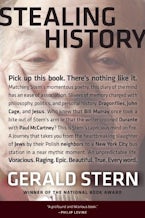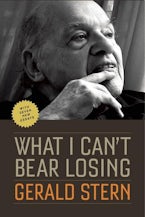In eighty-four short, intermingling essays, Gerald Stern moves nimbly between the past and the present, the personal and the philosophical. Creating the immediacy of dailiness, he writes about what he’s reading at the moment, be it Spinoza or John Cage, Maimonides or Lucille Clifton, and then seamlessly turns to memories of his student years in Europe on the G.I. Bill, or early family life in Pittsburgh, or his political and social activism.
Stern meditates on the Lamb in Christianity and Judaism. He explores the mysterious life of the dragonfly in all its permutations and examines the comedy of the Marx Brothers and the idea of adultery in Noel Coward’s film Brief Encounter. Interwoven with his formidable recollections (Stern, it would seem, forgets nothing) are the author’s passionate discussions of his lifelong obsessions: issues of justice; his identity as a secular Jew who has strong objections to Israel’s political positions; and the idea of neighbors in various forms—from the women of Gee’s Bend who together make astonishing quilts to the Polish inhabitants of the small town of Jedwabne, who on a single day in 1941 slaughtered 1,600 Jews. Revealing a poet engaged with imagination, memory, and witness, and written in Stern’s signature, associative style, Stealing History is a significant literary achievement by one of our most celebrated poets.










